Friday, May 28, 2010
 2:41 PM |
Love in the Ordinal Sequence
2:41 PM |
Love in the Ordinal Sequence
George Bernard Shaw once said, "First love is only a little foolishness and a lot of curiosity." This is so true. It's also a lot of "What the fuck was I thinking?" years and years later. In many ways, second loves, or even thirds and fourths, are so much even better... They're less foolish, still curious, but tempered by the intervening years of heartbreak and soul-searching. We love more honestly in the later years.
Labels: life, love
[0] This is Where You Bite the Sandwich
Thursday, May 27, 2010
 8:05 AM |
Ciao for Now.
8:05 AM |
Ciao for Now.

Labels: blogging, life
[0] This is Where You Bite the Sandwich
Wednesday, May 26, 2010
 11:34 PM |
A Little Confession
11:34 PM |
A Little Confession
Perhaps I'm just a little jealous. Because you're so full of life, and you seem to be enjoying the rest of your summer unencumbered by ... things. While I'm here, feeling like I'm slogging through so many demands on my time. I feel old and ravaged by the sun and every passing minute. I haven't even had my summer yet, and it's already ending. Plus there's the fact that I'm also busy pining for you. And you are there, like the light that got away.
Labels: life, love
[2] This is Where You Bite the Sandwich
Tuesday, May 25, 2010
 8:03 AM |
What Love Needs
8:03 AM |
What Love Needs
It would have been so simple to say: "I love him. And everything else can go to hell." But love needs the world to affirm itself.~ Pier Vittoro Tondelli in
Separate RoomsLabels: books, life, love, quotes
[0] This is Where You Bite the Sandwich
Monday, May 24, 2010
 10:08 AM |
10 Most Loved Mga Babaeng Bakla
10:08 AM |
10 Most Loved Mga Babaeng Bakla

The
“babaeng bakla” is the way she is because of several things. She knows how to lobby the
“taray” like a weapon of mass distraction, and she does it with wicked attitude and much aplomb—even if, ehem,
“hindi naman kagandahan.” (Some of them, anyway.) But she is able to cultivate a certain queer persona that verges on the ironic. Of course, there is always her capacity to make us laugh, a role that is usually ascribed by our society to swishy gay men. In the end, it is her penchant for low camp and self-deprecation that endears her to us. In films, she isn’t usually the star at all; she is most often the sidekick, and so the macho leading man don’t usually fall in love with her.
And there lies the root of our shared rainbow connection—and fascination.
In this list, we’ve tried to go beyond the obvious—yes, we know about Rufa Mae Quinto and Eugene Domingo and Kris Aquino and Ai-Ai de las Alas and Toni Gonzaga and Rosanna Roces. But this is
our list. Wanna pull hair over it? (Meow.)
[
read more here...]
Labels: film, people, queer
[0] This is Where You Bite the Sandwich
Sunday, May 23, 2010
 12:28 PM |
Eve of Gold at the Writers Village
12:28 PM |
Eve of Gold at the Writers Village
By Krip Yuson
A swallow had built a nest up in a corner of the wall behind the row of panelists facing the young writing fellows during every session held in the half-covered terrace of the main cottage at Camp Lookout. It took a week of assembling fresh grass strips for the nest to be completed, just about the duration of the third and final week of the 49th edition of the longest-running creative writing workshop in Asia — the Silliman University National Writers Workshop usually held in Dumaguete every Maytime.
As we pored over every line in a poem, story or creative non-fiction piece that had merited entry into the 15-strong fellowship this summer, swallows darted in and out above our heads, seeming to circle the company seated four-square before long tables.
On another wall, a large moth had attached itself and stayed still for a couple of days. Cicadas would raise a racket every now and then, even well before noontime, so that some of us would raise our voices, too — while pointing out this metaphor or that run-on line, the full application of objective correlatives to enrich a narrative, the fresh phrase that entices as appealingly as a well-turned ankle.
Jimmy Abad and I flew in on a Sunday, ready to begin our annual service for the third week. We were delighted to find ourselves on the same flight as balikbayans and former workshop fellows Fidelito Cortes and Nerissa Balce, vacationing from the eastern seaboard of the USA where they have taken up academic life after several years in the Bay Area.
We agreed to meet for dinner at Residencia Al Mar where they would lodge, right on Rizal Boulevard facing the sea. I texted a couple of writing fellows — Gel Galang and Tina del Rosario, who had been my Ateneo students — to join us, and to make sure to bring along Ida del Mundo of DLSU, Starweek writer, and her fellow Greenie and boyfriend Carlo Flordeliza.
Fittingly rounding up the company on our first evening’s socials was the workshop’s director-in-residence, Dr. Rowena Tiempo Torrevillas, visiting for a month from her second home in Iowa City.
We learned of how this summer’s batch was fortunate to break in the five brand-new cottages added to the former mainstay at Camp Lookout, with its commanding view of Tañon Strait. Now these six cottages constituted the Silliman University Rose Lamb-Sobrepeña Writers Village — a dream project conceived three decades ago by former SU President Dr. Quintin “King” Doromal, who had tragically left us recently.
Patron Enrique “Ike” Sobrepeña and current SU president Ben Malayang, under whose abiding interest and care the workshop had reverted to the university, reactivated the plan and before anyone knew it, the groundbreaking took place last November, and on Ike’s wife Rose’s birthday on April 10, the dedication and blessing ceremony for the site was held — in time for its first use for the 2010 writers’ workshop.
The following day, a van picked us up early at 8 a.m. from Coco Grande Hotel near the SU campus, to ferry us through the town of Valencia and up the foothills of Mt. Talinis or Cuernos de Negros.
We had our first appreciation of the Writers’ Village, a storied site for all those wondrous memories of decades past when we ourselves of a hoary generation had used it on weekend retreats, as far back as 1970 when the view was yet unbridled by now overgrown trees, and also notably during the 1984 workshop when Fidelito was a fellow, and most of us had spent overnight supine on the grass knoll under a majestic pine.
Now the main cottage has been rehabbed and refurbished, from its former all-wood confines to incorporate two concrete terrace levels. The 15 fellows soon joined us for the week’s first session, after which we tried out one of the smaller cottages for a post-prandial power nap. Four decades of reveries empowered us on that double-decker.
The first-week panelists were Susan Lara, Danny Reyes and true-blue Dumagueteño Bobby Villasis. On the second week, Rowena and Dr. Myrna Peña-Reyes, another poet-resident, and guest foreign writer Xu Xi of Hong Kong took over.
A much-published author, Xu Xi recently gained another distinction as the Bedell Distinguished Visiting Writer at the University of Iowa’s nonfiction program. She is presently the writer-in-residence at the English Dept. of The City University of Hong Kong, overseeing an international, low-residency MFA program that specializes in Asian Writing in English.
For the third week, Cesar Ruiz Aquino, now billed as Dumaguete’s Borges cum Sinatra, joined Rowena, Jimmy and me in the panel. We weren’t regaled by a similar highlight the fellows experienced on the second week — rolling fog quickly called “the mists of Avalon,” but there were still the swallows, butterflies and moths that cavorted with the dynamic fresh literature we had morning and afternoon. And, of course, on the surrounding “glens” and woods and roadsides were spontaneous gardens that featured torch ginger, heliconia, medinilla, large lilac pansy, baby’s breath, everlasting, cosmos, marigold, and wild red roses.
Joining the company too on the final week were balik-fellows Joel Toledo and Leslie dela Cruz, the latter a returnee from only two years ago, and now intent on completing a literary biography of Rowena and/in the workshop context.
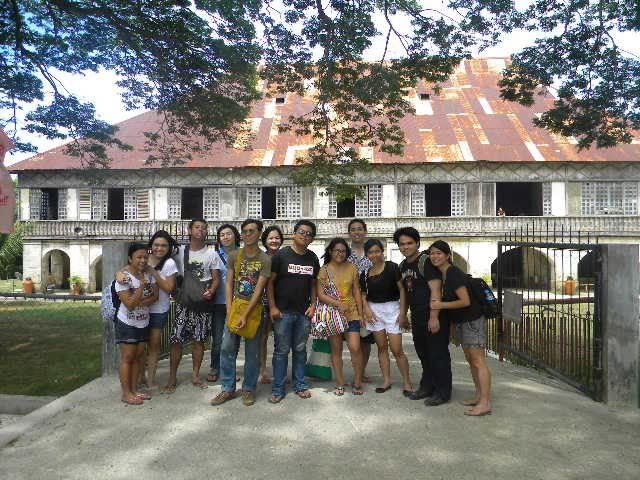
Besides Ida, Carlo, Gel and Tina, this summer’s lucky fellers were Jacob Dominguez and Dominique Santos of UST; Anne Carly Abad, Gino Dizon and Gian Lao of Ateneo; Jenette Vizcocho of UP Manila; Kelly Conlon and Aaron Jalalon of UP Mindanao; and Sam Echavez, Miro Frances Capili (daughter of artist Ross Capili) and Oscar Serquina Jr. of UP Diliman.
The first week’s Wednesday outing was hosted by Bravo Golf Course in Sibulan, formerly the Dumaguete Golf and Country Club, one of the country’s earliest golf courses. The second week’s picnic sessions were held at Lake Balanan off Siaton.
On our week, we were generously hosted by Annabelle Lee-Adriano and her family at Antulang Resort in Siaton. There I couldn’t join the fellows much at the saltwater and infinity pools or the cliff-shore, because I was busy being clobbered in the word game Probe by Annabelle’s and Edo’s precocious daughter, the prospective poet Anne or “Suyen,” together with her young aunt Magenta Villegas who helps manage the splendid resort.
Lord Jim and I were also invited to Gabby’s Bistro at Florentina Homes for a special screening of a 28-minute video-docu titled Dumaguete: Artists’ Haven — by Carmen del Prado, a senior at College of St. Benilde, and a daughter of Wing and Nonoy del Prado, the hoteliers who run such an elegant venue, with all of the art on the complex’s walls done by Wing. The fast-paced, well-edited video-docu starts with a voice prologue by Dumaguete writer Ian Casocot, followed by an interview with Mom Edith, before it focuses on 19 other local artists: painters, sculptors, musicians, photographers, and designers.
A poetry reading was held at Mariyah Gallery, hosted by the outstanding painter-sculptor Kitty Taniguchi and her brother Danny Sollesta, himself a sculptor of the first water, whose recent monument of Leon Kilat in Bacong I just had to see and photograph.
The Director’s Dinner at Montemar privileged us with the company of Mom Edith, or Dr. Edith L. Tiempo, National Artist, the workshop’s director emeritus, now all of 90 years, but still singing along to the operatic renditions of Manolito Saldivar and writing fellow Aaron’s Jejemon number.
We must say thanks to workshop coordinator Dr. Evelyn Mascuñana, English and Literature Dept. Chair, ably assisted by Alana Narciso and Parts Partosa of the secretariat as well as transport officer Prof. Philip Van Peel.
This year’s fellows were truly an excellent batch, with very strong voices in poetry, fiction and CNF, as well as critiquing skills, so that we wouldn’t be surprised if a few of these guys wind up as first-rate literary critics, the way they augmented the panelists’ commentaries with their own,
Next year the workshop turns golden. The 50th anniversary will see an anthology and a video-docu that are being planned this early. We call on all alumni of the workshop to join in, in more ways than one.
Labels: dumaguete, dumaguete writers workshop, negros, philippine literature, writers, writing
[0] This is Where You Bite the Sandwich
 1:27 AM |
Sorrow and Habit
1:27 AM |
Sorrow and Habit
Years ago I said to myself: "There's no such thing as old age; there is only sorrow."
I have learned with the passing of time that this, though true, is not the whole truth. The other producer of old age is habit: the deathly process of doing the same thing in the same way at the same hour day after day, first from carelessness, then from inclination, at last from cowardice or inertia. Luckily the inconsequent life is not the only alternative; for caprice is as ruinous as routine. Habit is necessary; it is the habit of having habits, of turning a trail into a rut, that must be incessantly fought against if one is to remain alive.~ Edith Wharton,
A Backward GlanceLabels: life, quotes, writers
[1] This is Where You Bite the Sandwich
Thursday, May 20, 2010
Talk about following a long day with another long day. Yesterday may have been a grand day at a beach resort in Antulang, but a summer day break it was not. It was to help chaperone the fellows from the National Writers Workshop [a day I spent watching Glee and putting in at least two hours of sleep after a Tuesday night spent drinking in Escaño], which segued to a night spent in the chilly hills of Valencia at the Writers Village [also known as Camp Lookout].
I was asked by Mariekhan Sarte Edding earlier this week [during the premiere of Carmen's film] what keeps me busy. And so, off the top of my head, I started rattling out my list of things to do. It quickly dawned on both of us: how do I manage to do all these things, and still have time to breathe, sleep, and hang out in Escaño? The best answer I can give: love, magic, a good book on hand, Red Bull, and a new personal secretary in the person of Mars. Haha!
Today, after coming down from Valencia, I launched into another long day, doing errands, paying bills, getting a haircut, shopping for groceries for tomorrow's breakfast party, gathering materials for a short tribute to Quentin Doromal in tomorrow's workshop closing ceremonies, and finalizing the roster of performances for tomorrow night's Poetry Jam at Jutsz Cafe with the fellows. I capped it all off with a great foot spa.
There's still the dinner at Kitty's tonight, and the design of a prospective brochure for the new cultural season to submit. This was quite a day. And it's not even over yet.
And so we continue living...
Labels: life
[0] This is Where You Bite the Sandwich
 1:39 PM |
Ava, oh Ava!
1:39 PM |
Ava, oh Ava!
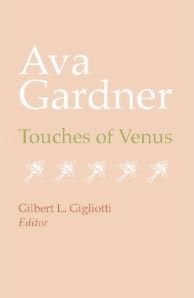
I don't know why, but my story "Old Movies" seems to strike a particularly international cord. First, it was translated in French some years ago. Now, it's anthologized in a recently-released American book,
Ava Gardner: Touches of Venus, edited by Gilbert L. Gigliotti. Together with Margaret Atwood and Robert Graves
pa! [
Hinimatay...]
Labels: books, fiction, writing
[2] This is Where You Bite the Sandwich
Tuesday, May 18, 2010
 10:54 PM |
A Colorful Town and Its Artists
10:54 PM |
A Colorful Town and Its Artists
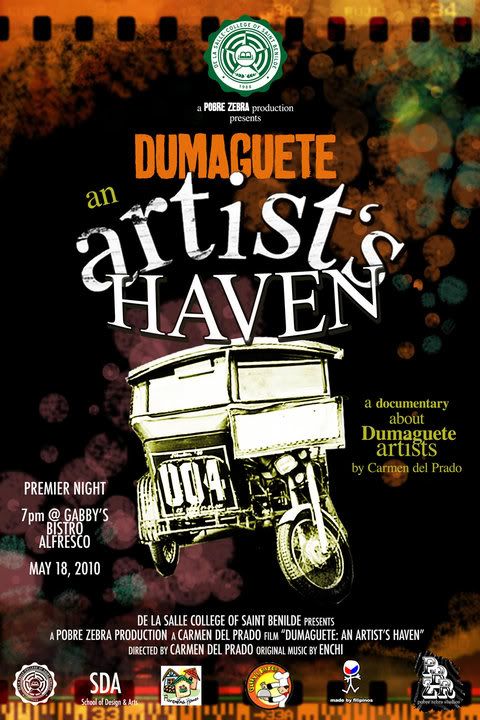
Carmen Singson del Prado’s debut documentary
Dumaguete: An Artist’s Haven, which had its local premiere last May 18 at Gabby’s Bistro, manages to do several things at once—all of which I can more or less summarize to two basic points.
First, the film makes for a surprisingly comprehensive survey, given its two-week shoot, of the state of art and culture in Dumaguete (which includes people in painting, photography and design, literature, and even a little bit of film, theater, and music).
Second, it makes Dumaguete look like the coolest, most colorful, most-happening art haven in the whole country. The city bounces with such joy in this film, which is already a delight in itself to behold. If
Dumaguete should make one form of achievement in at least one possible avenue, it succeeds as an unintentional, wholly accidental tourism come-on. It does in one quick half-an-hour what a thousand generic but official tourism videos about Dumaguete accomplish in the entire span of their shelf-lives.
Thank God then that the whole project also succeeds as documentary cinema.
But first, to contextualize the effort. Because one must make a case for the enterprise known as documentary filmmaking—an often infuriating undertaking that takes into consideration the mostly accidental of things. The documentarian captures what she can, and constructs a narrative from what she has—a situation that is a far cry from fictional filmmaking where everything is fabricated, woven out of thin air. True, while the documentary filmmaker may have a general story to pursue at the outset—let’s say, for example, Michael Moore waking one day to tell himself, “I am going to start a film about the American health care system today”— for the most part, it is a voyage into the “formless.” The ultimate goal is eventually wringing out an interesting story—
with a dramatic arch—out of the endless hours of footage one has taken. The documentary filmmaker’s best friend is really luck—about being there at the right time to capture the right scene just as it unfolds—and his best tool is an unsurpassed skill in editing that puts together into coherence all those footage taken from the chaos.
It is not an easy thing to do, this kind of filmmaking.
So I can imagine Ms. Del Prado seizing one day this idea to make a film about artists in Dumaguete—and then to contrast it with the matter of actually doing it. “The primary reason,” she would admit later on, “was that this was my hometown.” What she wanted to do was to put Dumaguete on the map of art and culture of the Philippines, at least in terms of cinematic documentation
“This place,” she told me once, “is crawling with artists.” Which is true. All cities and towns, of course, have their fair share of artists—but Dumaguete, like Baguio its spiritual cousin, seems to have more than its fair share; its atmosphere, in fact, drips with bohemian romance. And she would know that very well, coming as she does from a family of artists: her father—a farmer—is also a photographer, her mother is a painter, one brother is a chef, another is an animator, and still another is into
hilot. The youngest of them is showing some interest in the visual arts. That Carmen has gone into a very specific kind of filmmaking seems both pre-ordained and brave. For who does documentaries these days in the Philippines beyond the newsy stuff we get on television? Perhaps only Nick Deocampo and Ramona S. Diaz?
I remember Ms. Del Prado emailing me not too long ago asking for suggestions about whom to interview in Dumaguete. What she had initially in mind was a project focusing on five local artists—but I emailed back a long list that included not just visual artists, but also theater people, writers, filmmakers, graphic designers, photographers, dancers, and musicians. When she finally came around to shooting, with five subjects quickly turning to twenty, it soon became a project that needed a center of gravity: there were many talking heads speaking at length about art in the city—
but what would the film be ultimately about? The finished film, I can finally say, has that story, that center—although it is not easily palpable. It is not a story about the process of art-making. You don’t see here select people being followed into the hidden corners of their personal lives as they grapple and agonize about making art. The film is not about that at all. It is a mapping of sorts, a geographically-specific project that tries to define a place through the prism of one peculiarity. That peculiarity is Dumaguete’s attraction for the artistic type—how they come here, how the place nurtures them, how it is a haven. Hence, the title.
Watching the film, one becomes amazed by the color and vibrancy captured by Ms. Del Prado’s camera as it roams the city streets, capturing minutiae and what-not, traveling the city’s lengths to chronicle, in comfortable snippets, the passions of Dumaguete’s many art-makers.
There’s Jutze Pamate talking about local art history, there’s Kitty Taniguchi talking about the literary foregrounding of her famous paintings, there’s Yvette Malahay-Kim talking about setting up a fine arts program in the academe. There’s National Artist for Literature Edith Tiempo talking about the inspiration Dumaguete has brought to many writers, there’s Elizabeth Susan Vista-Suarez talking about local music, there’s Dessa Quesada-Palm talking about the advocacy ingrained in community theater. Then there’s Hersley Ven Casero, there’s Greg Morales, there’s Karl Aguila. There’s Ramon del Prado, there’s Phil Calumpang, there’s JM Aguilar. All of them coming to terms with the place and what it means in their pursuit of their individual craft. And, weaving through the film as its inspired soundtrack, there’s the music of Enchi, perhaps the most well-known of Dumaguete’s alternative music bands. It’s really a merry motley crew of the city’s denizens of creative expression, all gathered to make one story—that of the city and its relationship with its artists: how it opens itself as a comfortable haven for the budding painter, the searching filmmaker, the promising writer.
A full disclosure is in order: I’m part of the whole thing, my talking head punctuating space in the film here and there. My voice, in fact, opens the film, making some pronouncement about “the place of Art in our lives” over the title sequence. (That was one strange sensation, settling down to enjoy a film, and then begin it by hearing your own voice.)
But my enthusiasm goes beyond my small participation.
For a novice filmmaker, Ms. Del Prado, who is only 19, impresses by simply managing to make a film with such steady control of her cinematic aesthetics. Her sense of storytelling is laudable, gathering what could have been merely a filmed catalogue of artistic profiles into a narrative point that ends with the Big Event, in this case, the holding of Dumaguete’s Arts Month celebration. Her eye for cinematography also does something magical: it virtually opens up the small city, and makes it wide, colorful, accessible,
fun. Her editing is impeccable—the pacing is just right, and it weaves its various threads together into what could easily pass for solid entertainment. She also takes on an unwieldy subject—all these artists and their colorful eccentricities—and tempers it to make a grand narrative about a town and its unique relationship with art-making.
Congratulations, Carmen. Here’s all of us hoping to see more films from you.
Labels: art and culture, dumaguete, film, negros
[0] This is Where You Bite the Sandwich
 6:09 PM |
Prescription for Living
6:09 PM |
Prescription for Living
Try to start the day with a smile, or at least a good breakfast. Always begin with low expectations. Drink Red Bull. Follow your feet all throughout the day, but know exactly where you are at the moment. Live the present. Say no more often than you say yes. Do what you can for the day, but just
do something. Be open to the hum of the universe, and never stop believing that love is all around. End the night with a good book, or a good movie. Pray.
Labels: life, love
[1] This is Where You Bite the Sandwich
Sunday, May 16, 2010
 9:56 AM |
The Villar Question
9:56 AM |
The Villar Question
It was ... the final straw--the ultimate confirmation that [Manny] Villar, in his quest for the presidency, was prepared to do anything to get what he wanted. He would throw away billions, engage in a pernicious campaign that ran the risk of blackening his name (as it did), invoke his brother's death for sympathy votes and allow his frail mother to fight his fight for him on TV--he would go through all these because he so badly wanted to be in power. Why? What was it about the presidency that made him so willing to give up so much? The thought has a scary, creepy element to it. ~ Gibbs Cadiz on
the disastrous Villar presidential campaignLabels: blogging, issues, politics, quotes
[0] This is Where You Bite the Sandwich
 9:13 AM |
Mountain lions
9:13 AM |
Mountain lions
By Jacob Walse Dominguez1.
I always thought that mountain lions
weren’t real. Imagine
my surprise when up here,
I saw one. Rumors abounded—
there wasn’t one at all, my eyes
were only playing tricks on me,
at least the old ones said. Someone
told me the lion was dead, he wasn’t
there at all. Another said he
moved to another mountain. But I saw
him. He was brown and quiet
and he slinked among us unseen
save for small glances. He was here.
2.
Zapped by impulse I took
a red motorcycle down
the mountain, red skies kissing
my face with anticipation.
Down in the city I got
a pack of Camels, walked
in the sweltering heat and
found the lion between books
except
he wasn’t a mountain lion at all,
at least not anymore because
upon closer inspection
he had a collar and leash.
3.
I think I got on the lion’s back,
I remember running my fingers
through his coarse mane and
tugging, smelling it. It smelled like
the sun. Like the salt of the sea.
Like the dust of the city. I was told that
these lions smelled of pine and earth,
of sun and water. Of the sun part,
they were right.
I remember the seaside
the lion’s paw on the small
of my back—the breathlessness:
I remember that.
I know the lion’s breath was
warm and panting.
Drunk
with the ocean’s song I smiled
and rum-eyed,
I kissed him.
Labels: poetry
[0] This is Where You Bite the Sandwich
Friday, May 14, 2010
By Marge PiercyPeople often labor to attain
what turns out to be entrance
to a small closet
or a deep pit
or sorrow like a toothache of the brain.
I wanted you. I fought you
for yourself, I wrestled
to open you, I hung on.
I sat on my love as on the lid
of a chest holding a hungry bear.
You were what I wanted: you
still are. Now my wanting
feeds on success and grows,
a cowbird chick in a warbler's
nest, bigger by the hour, bolder
and louder, screeching and gaping
for more, flapping bald wings.
I am ungainly in love as a house
dancing. I am a factory chimney
that as learned to play Bach
like a carillon. I belch rusty
smoke and flames and strange music.
I am a locomotive that wants to fly to the moon.
I should wear black
on black like a Greek village woman,
making signs against the evil eye
and powder my heat white. Though I try
to hide it I burn with joy like a bonfire
on a mountain, and tomorrow
and the next day make me shudder
equally with hope and fear.
Labels: life, love, poetry
[0] This is Where You Bite the Sandwich
 12:01 AM |
Angelica Panganiban is a Convincing Gay Man and Other Bridal Tales
12:01 AM |
Angelica Panganiban is a Convincing Gay Man and Other Bridal Tales

The buzz from friends in Manila was simply too hard to ignore. Mark, for example, texted me earlier today: "You have got to see
Here Comes the Bride. Angelica Panganiban is too funny!"
Angelica Panganiban funny? That got me thinking.
The first time I actually heard about the film was when Chris Martinez, its director and writer, was in the beginning stages of writing it. He was in Dumaguete to screen his first film
100, and Eugene Domingo was with him. (A few months before that, he was also here to direct Mailes Kanapi in his Palanca-winning play
Welcome to Intelstar.)
We were all having dinner in Basil Tree Cafe, and I had asked him, "What's next?" He said, "Well, some commercial film, a comedy. Something titled
Here Comes the Bride. For Star Cinema." We both laughed. The title sounded cheesy but promising, and I thought no more of it.
Two years later, here comes the film -- and by God,
it is funny. Perhaps the funniest Filipnio movie since last year's
Kimmy Dora, which Chris also wrote for director Joyce Bernal. And that is saying a lot.
I had no idea, for one thing, that Ms. Panganiban would make for a very convincing gay man. Or that John Lapus could play a dandy so well -- our collective cringe-factor all part of the film's comic calculations. There are other delightful surprises in the film, with standout comic characterizations by Eugene Domingo [who is still very much a force of nature in contemporary comedy], Jaime Fabregas, and Tuesday Vargas [who probably embodies the best incarnation of Inday the Super Maid], who -- together with Ms. Panganiban and Mr. Lapus -- compose the handful of afflicted souls who, while en route to a beachside wedding, mysteriously transfer to each other's bodies in an accident of timing, geography, magnetism, and a solar eclipse.
All sorts of shenanigans ensue as each one [save for the panicking bride who understandably wants to save her wedding day] comes to terms with his or her new body -- and starts to delight in the possibilities. We've had soul switchero films before, most notably in
Freaky Friday [2003] and Vice Versa [1988], but Mr. Martinez's take on that cinematic conceit does not feel like a retread at all. It somehow takes that tired gimmick, launders it with Filipino sensibility and humor, and creates something original, something crackling with sheer unpredictability.
How it all gets resolved is both satisfying and funny, and proves without doubt Mr. Martinez's storytelling inventiveness that also respects the narrative's internal logic, something that only the truest writers know about.
Just see the film, and laugh your heart out.
Labels: film
[0] This is Where You Bite the Sandwich
Thursday, May 13, 2010
 9:49 AM |
Searching for May Time in Dumaguete
9:49 AM |
Searching for May Time in Dumaguete
I have always loved May time in Dumaguete. It was always, always magical -- as if the city was born for this time of the year. There was always the smell of sweet sepia coming from everywhere, the acacia trees and the sight of sea combining to make aflutter any romantic's heart. There was that constant bohemian air. There were those sultry summer days and nights that led to adventures of the senses. There were concerts, exhibits, dance and music mixers, beach outings, mountain trips, and endless unplanned dinner partiess with friends and family.
What happened?
There has only been crippling heat so far, and everybody's always sick. The artists are gone, the writers are in the mountains. The "parties" feel tired. The only excitement that has come into our summer lives was the rabid election spirit that had sowed only division and untold recriminations.
It's not about high expectations and the disappointment that comes with it, either. We've always expected May time in Dumaguete to be magical, and it has always delivered. So what happened?
I want my old summers back.
Labels: dumaguete, life, rants
[0] This is Where You Bite the Sandwich
Tuesday, May 11, 2010
 11:42 AM |
Some Fast Thoughts for the Morning After
11:42 AM |
Some Fast Thoughts for the Morning After
"One of the penalties for refusing to participate in politics is that you end up governed by your inferiors."~ Plato
As of lunch time today, Senator Noynoy Aquino appears to be winning. I didn't vote for him, but I still say "Not bad." Better him than a Villar presidency. What most of us could not fathom, however, is how close former President Joseph Estrada has come close to winning,
again. And to study the list of who could be our next batch of Senators, we encounter again many names that are more head-scratching.
Marcos? Lapid? Revilla? Sotto? Why, why? To quote blogger historian Ari Ngaseo, "As much as I would like to idealize them, the Filipino masses always make the most godawful choices, judging by the election results." Then there is Makati Mayor Jejomar Binay who seems to be on the threshold of getting the post of second-in-command.
Nobody saw that coming at all. Many of my friends in the Capital seem bothered immensely by this, but they know Manila politics more and we in Dumaguete are much too far away to understand the nuances of their dislike. I voted for Mar Roxas though, and I honestly thought he would win. But now, with him struggling to edge past Binay, I seriously think that maybe marrying Korina Sanchez was a bad political move. That seemed to be the only obvious, albeit un-talked about, reason. For the past weeks, everywhere I go, and from people I meet, there seemed to be only this: an unhindered dislike for the former TV journalist, with some comments comparing her to the high-minded ways of Imelda Marcos, who is now, by the way, a member of Congress (together with Manny Pacquiao and Gloria Macapagal-Arroyo --
what a fun circus this is). I don't know exactly the specifics for how this reputation originated; I've met Mar and Korina once, and they were extremely nice to me.
Still...These are my thought balloons plastered in Facebook as Election Day wore on: "It took me three freaking hours to vote. But I'm not complaining. At least I voted." "At least Miguel Syjuco kept me company. I read two chapters of
IIustrado while I waited for my turn to vote." "Burly man -- dark as earth and looking like a bulldog -- was a typhoon of booming noise and unnecessary complaints in Precinct 0161A in Lo-oc. Gah." "I actually [feel] violated by the very long wait and the odorous press of the bodies of exasperated people." "I could only vote for three city councilors: the rest were
meh. They were either political dinosaurs I wanted retired or complete unknowns who have no known track record of service. One wishes for wannabe politicians who make a point of working for the city before an election comes along." "When I saw the word 'Congratulations!' it seemed like the sweetest word ever in the world." "Must shower now, or eat. Whichever comes first."
And then later, as Election Day ended and partial results were being announced everywhere: "I just woke up from a most tiring day. I should have waited till this time [5 pm] to vote, I would have avoided the stress. Because as far as COMELEC goes, the early bird does not always get the worm. It gets the heat and the sweat of exasperated people." "I'm amused over how Villar got Pichay-ed." "Manny Pacquiao, Gloria Macapagal-Arroyo, and Imelda Marcos in Congress. 'Nuff said." "Villanueva and De los Reyes don't make the cut. Does that mean they were listening to God wrong?"
My choices for the country's top posts didn't make the cut either. But right now, at least my choice for Dumaguete City mayor won. For a while there, I thought businessman Chiquiting Sagarbarria wouldn't, and the margin in the official count is quite small at 55 votes.
Fifty-five votes! Which just goes to show that every vote does count. Still, I'm sad for Myrish Cadapan-Antonio, though, who lost the vice-mayoralty vote to Alan Cordova, an Independent candidate who seemed to have charmed many of the people I know -- these are educated people who were Myrish's supporters when she ran and won as the #1 city councilor a few years ago. I wonder what happened there? I know many of my friends who were gunning for a Woodrow Maquiling win. Still, I'm happy that Jocelyn Limkaichong won the congressional seat for the First District of Negros Oriental, thus further burying into political irrelevance the much-hated Paras dynasty. I voted for George Arnaiz as my Second District representative -- but it was mostly because there was no other viable choice. Same for the governorship, which perennial Gov. Emilio Macias II seem on the edge of getting
again. (He was already governor when I was in grade school. And I would have wanted new blood to keep the race interesting -- but I just could not bring myself to vote for Petit Baldado.) And I would have wanted former Bayawan City Mayor German Saraña to win the vice-governorship. His track record as mayor for my hometown is sterling -- but I guess he did not exactly lead a good campaign. Nobody knew about him even until Election Day. It looks like former Dumaguete Mayor Tuting Perdices is winning that one.
So now it's time for the City to start working. And the new leaders are...
For Dumaguete Mayor:Manuel Sagarbarria (NPC) - 20,555
Woodrow Maquiling (LP) - 20,504
For Dumaguete Vice Mayor:Alan Cordova (Ind). 20,198
Myrish Cadapan-Antonio (LP) - 14,724
Dumaguete City Councilors:Antonio Remollo (LP)
Joe Ken Arbas (LP)
Frank Esmeña (LP)
Erwin Macias (NPC)
Nilo Sayson (LP)
Jayvee Imbo (NPC)
Manny Arbon (LP)
Espiridion Catan (NPC)
Noel de Jesus (NPC)
Dan Leon (Lakas)
And I look at the list of City Dads, and is happy to note that many of the old fogeys have been retired. Thank God.
Labels: dumaguete, negros, politics
[0] This is Where You Bite the Sandwich
Monday, May 10, 2010
 1:32 PM |
I Voted Today... [Forgive the Hair Though.]
1:32 PM |
I Voted Today... [Forgive the Hair Though.]
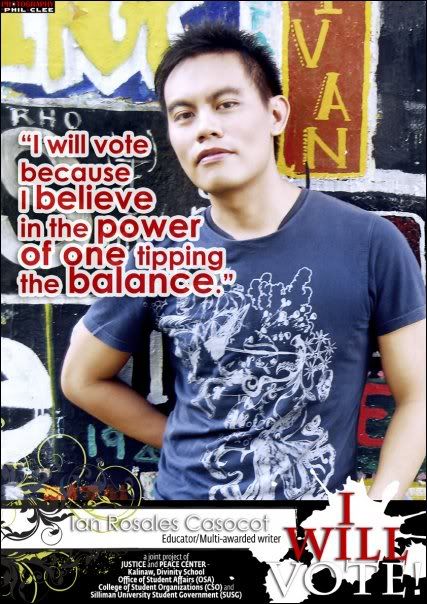
Labels: life, politics
[0] This is Where You Bite the Sandwich
Sunday, May 09, 2010
"We did what we could: the slogan of the underachiever, the excuse maker, the loser. What they did … was smoke weed, argue about Theory, sleep with one another’s girlfriends and boyfriends and wonder what was going to happen next."
~ A.O. Scott on Generation X
Labels: life, quotes
[1] This is Where You Bite the Sandwich
[1]
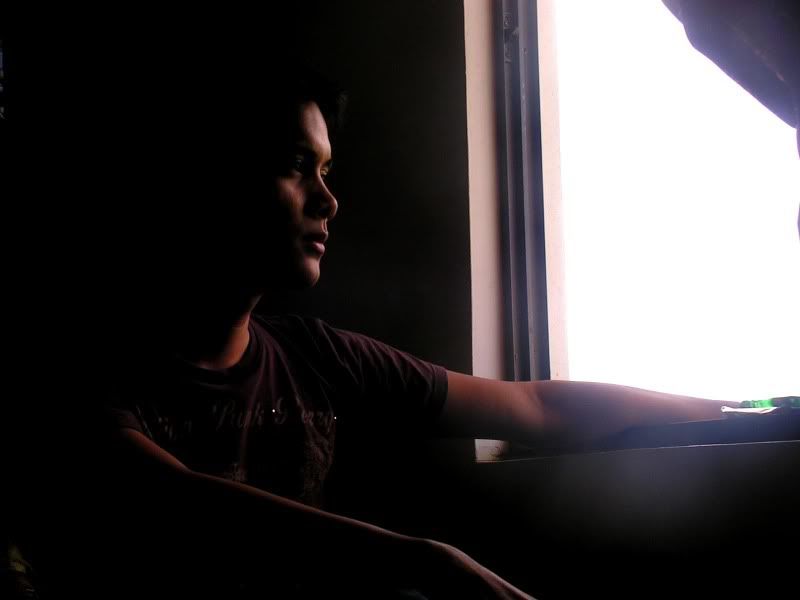
[2]
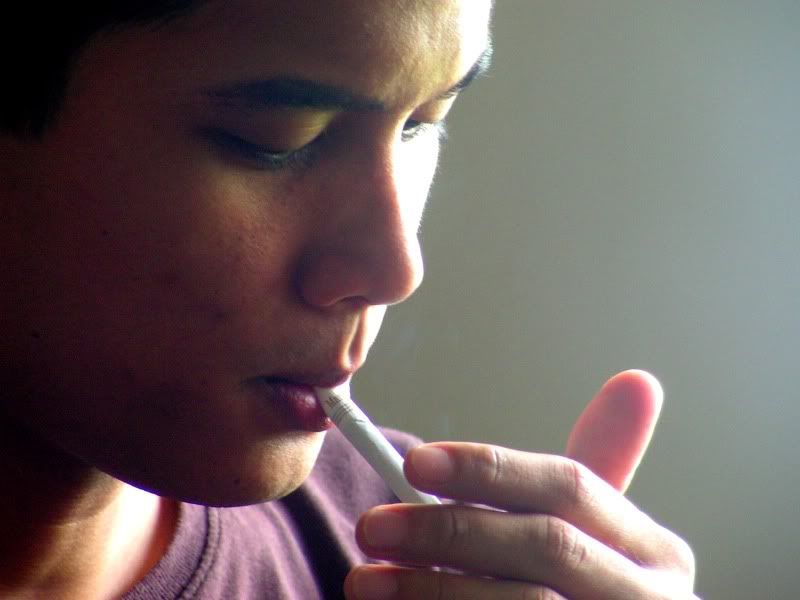
[3]

[4]
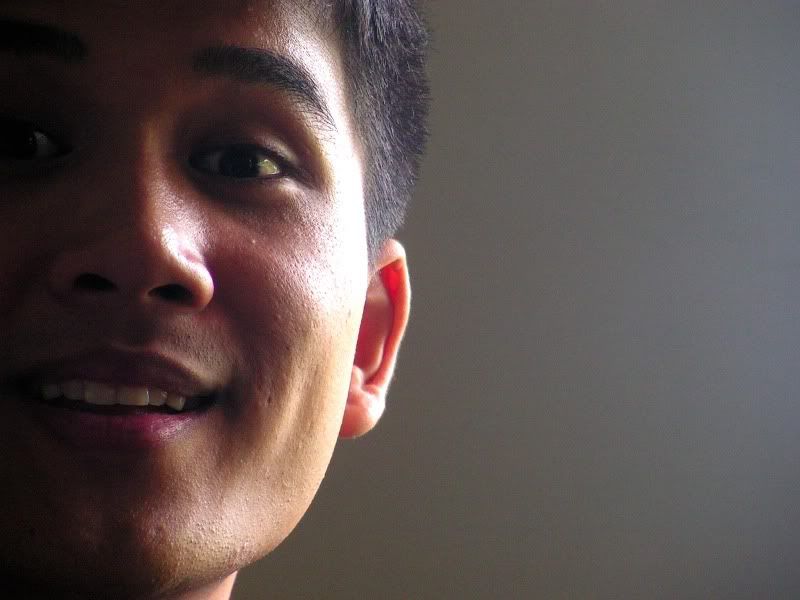
[5]

[6]

Labels: photography
[2] This is Where You Bite the Sandwich
 4:23 PM |
Life is Like a Box of Chocolate...
4:23 PM |
Life is Like a Box of Chocolate...
Why is it that the things that we don't get at all—like falling in love with all sorts of wrong people this side of heartbreak—are sometimes the ones that make most sense?Labels: talking to myself
[0] This is Where You Bite the Sandwich
 3:54 PM |
Matt Dorfman's Generation X Has a Midlife Crisis
3:54 PM |
Matt Dorfman's Generation X Has a Midlife Crisis
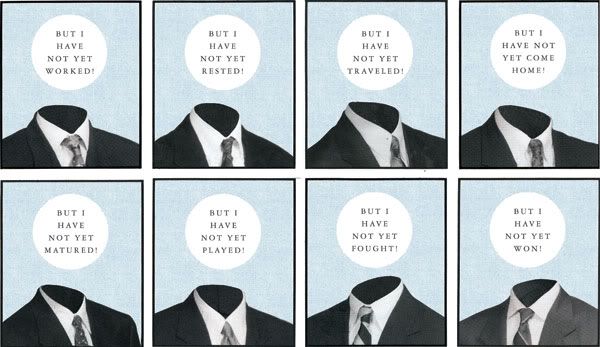
Labels: graphics, life, things that caught my eye
[2] This is Where You Bite the Sandwich
Friday, May 07, 2010
 12:03 PM |
Why Manny Villar Does Not Get My Vote
12:03 PM |
Why Manny Villar Does Not Get My Vote
By Gerry AlanguilanYesterday I received an email from what I assume to be a comics industry colleague, forwarding an article by Buddy Cunanan on why he will be voting for Manny Villar.
This post is not a point by point rebuttal of that forwarded article. The truth is, this is not a reaction to that article at all. I am simply offering my own separate views on why I won’t be doing the same thing.
Here was my response:
Since I received a message of endorsement for Manny Villar in a bulk email, I cannot help but offer my own opinion in return. I notice that there are many in this list who belong to the comics industry, and perhaps the art industry as a whole.
As an artist who values my freedom to express myself in my chosen field of art, I am honestly, and desperately terrified of a Manny Villar presidency. And I believe all artists in the Philippines should be.
Some of you may now no longer remember that as a Senator, Manny Villar filed a bill with the Senate called the “Anti Obscenity Bill”, or the Senate Bill 2464 where there is a strongly worded provision that portrayal of “nudity” in art will be punishable by law REGARDLESS OF THE MOTIVE of the author.
We all know the evils of pornography, and it is something I myself do not condone. But I also celebrate the beauty of art, and my God given human right to enjoy it and to create it.
As an artist, it is a bill that gravely concerns me because it has the potential to seriously curtail not only my freedoms as an artist, but my the ability to make my own choices as a mature, intelligent and moral human being.
By punishing the portrayal of nudity regardless of the motive of the author, it means nudity can no longer be portrayed by painters, filmmakers, graphic novelists, illustrators, sculptors, etc. Books on anatomy will now have to be censored, as well as medical books, history books specially on images of nudity on religious structures such as the Sistine chapel. Artists can no longer use nudity to portray innate human beauty.
Rightly so, the bill did not get the proper support in the Senate, and was shelved. Even then, by his filing of this bill, we get a definite idea of who Manny Villar is in terms of his views on art. He wants to censor it. He is of the belief that an adult Filipino is not capable of being mature enough to choose for himself (or herself) and decide for himself what to read, see, and hear. In other words, he does not believe that we can think for ourselves. He wants himself, and other people in power to think for us, and to decide for us, what is good for us or not.
This a reflection of Manny Villar’s character, and I’m sure this is how he will approach other issues as well. This has repercussions well beyond the field of art.
Manny Villar attended a Blogger’s meet last year to discuss with the youth the issues that concern them. My friend Jonas Diego attended this meet, and several times during the meet, he tried to raise the issue of the Anti Obscenity Bill. Jonas was never even given the chance to properly finish asking his question before he was waved away, his question trivialized and de-emphasized.
Not only has Villar shown that he is perfectly willing to censor the artist, he is also perfectly willing to ignore us as well.
This issue is a legitimate concern and is NOT black propaganda. It’s still up to you if you still want to vote for this man or not. But I feel that I needed to raise this issue, at least one more time just to let people become aware of just what they’re getting into.
I myself am not endorsing anyone in this election. Who I vote for remains a personal issue. This is not a campaign to steer the vote in favor of another candidate. I just feel that come election day, everyone should be made aware just who it is they’re putting into power.
Because by God, we’ll be paying for it for the next six years. Election day is the one day when we have the power. I hope and pray people use that power responsibly.
[
original post here]
Labels: art and culture, politics, rants, writers
[1] This is Where You Bite the Sandwich
Thursday, May 06, 2010
By Jellaludin RumiIf anyone asks you
how the perfect satisfaction
of all our sexual wanting
will look, lift your face
and say,
Like this.
When someone mentions the gracefulness
of the nightsky, climb up on the roof
and dance and say,
Like this.
If anyone wants to know what "spirit" is,
or what "God’s fragrance" means,
lean your head toward him or her.
Keep your face there close.
Like this.
When someone quotes the old poetic image
about clouds gradually uncovering the moon,
slowly loosen knot by knot the strings
of your robe.
Like this.
If anyone wonders how Jesus raised the dead,
don’t try to explain the miracle.
Kiss me on the lips.
Like this. Like this.
When someone asks what it means
to "die for love," point
here.
If someone asks how tall I am, frown
and measure with your fingers the space
between the creases on your forehead.
This tall.
The soul sometimes leaves the body, the returns.
When someone doesn’t believe that,
walk back into my house.
Like this.
When lovers moan,
they’re telling our story.
Like this.
I am a sky where spirits live.
Stare into this deepening blue,
while the breeze says a secret.
Like this.
When someone asks what there is to do,
light the candle in his hand.
Like this.
How did Joseph’s scent come to Jacob?
Huuuuu.
How did Jacob’s sight return?
Huuuu.
A little wind cleans the eyes.
Like this.
When Shams comes back from Tabriz,
he’ll put just his head around the edge
of the door to surprise us
Like this.
Labels: poetry
[0] This is Where You Bite the Sandwich
 4:32 PM |
The Lovely Loneliness
4:32 PM |
The Lovely Loneliness
I have never felt so alone in my entire life like today. The strangest thing is that I say that in an almost matter-of-fact way, not drowned in stultifying sadness the way it usually comes. Well, maybe just a tinge of melancholy, but nothing more. It comes to me as something frank and bold, as a voice from the back of my head that speaks dripping with the knowledge and the emotions that come with weathered time. It says, "You really are alone in life, you know. Other people are only joyful coincidences. When they're there for you, rejoice that it happens. But for the most part, don't stake your life on other people being there for you." Wherever that voice comes from, I thank it. Because it tells me once more I can't live with the demon that has plagued me all these years. Once, seven years ago, a friend named Gabriela read my cards and told me, "Your greatest enemy is complacency." She was right. She still is. The years hence have been a constant battle against that demon; I've won some skirmishes, lost others. But last night with Ginny [who was also there that night of the tarot] brought it all back to me once again. We went to remember the places we used to haunt all those nights seven years ago, Qyosko most especially. And the memory of the tarot came rushing back to me. I realize that I have let complacency take root in my life again: for the most part, I have depended again on the rare kindness of other people. I have also wasted too many hours on the pursuit of things that have only brought me both nothingness and pain. This morning, I wake up with these old emotions. It took me a while to get up from bed, and process whatever needed processing.
But I'm awake now.
And I will make this one life I've been given to live to make sure things will matter, even when I'm all alone.
Labels: life
[0] This is Where You Bite the Sandwich
Monday, May 03, 2010
 12:08 AM |
Writing for Dummies
12:08 AM |
Writing for Dummies
Somebody in my life texted me today. "I finally liked your column this week," he says. That's how he gives compliments about how I write, in an underhanded way that is annoyingly supercilious. I used to be bothered about it, but I've since realized I don't really write for people who writes "the same" as "de same."
Labels: rants, writing
[0] This is Where You Bite the Sandwich
Sunday, May 02, 2010
 3:16 PM |
J. Neil C. Garcia and Rowena Tiempo-Torrevillas on Edith Lopez Tiempo's "Bonsai"
3:16 PM |
J. Neil C. Garcia and Rowena Tiempo-Torrevillas on Edith Lopez Tiempo's "Bonsai"
[Read
this post first]
J. Neil C. Garcia writes:Poems are strange in that they are intimately intersubjective, especially when they are read across a significant “sweep” of time. Contrary to the evidence, they really do have their own agency as works of art, and this becomes all the clearer when one engages them at different points in one’s life: because poems are built as much on absence as on presence, they are never completely exhausted in any one reading. And so, they open up and offer distinct entry-points to one’s earnest inquiry, each of them revealing the deep personal space—we might also say, the spiritual distance—that one has traveled since the last visit. We often speak of writers as companion spirits, but I also think it’s possible to speak of companion poems, those that accompany us as we plug along our respective paths; those that (as the local proverb counsels) bid us turn around and look back, every now and then, lest we lose not only our way, but also, alas, our very self (because without hindsight there is no memory, and where there is no memory, there is no sameness from one moment to the next; which is to say, there is no identity).
This is one of the few Filipino poems that I can say have accompanied and “stayed” with me through the various and often tortuous periods in my continuing apprenticeship to the written word. The lived moment in the poem, which this annotation now so wonderfully affirms, was what struck me about it, from the very start. Already, then, I wondered what the poem’s "antecedent scenario" (Vendler's terminology) might be: what is the experience that prompts this speech (which is the same thing as the poem) into being? In particular, where (at least emotionally speaking) might the speaker be, at the exact moment that she (a mother, a wife, a believer) begins to speak? These questions serve to accentuate the fact that art, while merely an imitation of life, is nonetheless also rooted inexorably in it... up to now, these are the questions i still ask my students to answer for themselves, before they can credibly recite—actually, before they can endeavor to do anything at all to—this poem. Just now, I'm remembering that my interest in the representational power of this text coincided with my fascination with its concise and paradoxical use of imagery, most astonishingly exemplified, to my mind, in the simultaneously mundane and divine metaphor of sea shells as “God’s own bright teeth"... needless to say, from the get-go “bonsai” struck me as referring wonderfully to sundry objects and realities in the world (ah, the inventory of loved mementos!) which, like the singular poem that it is, it not only captures in the “best words" arranged in the "best order,” but also thereby generously transfigures…
And still, after all these years, the poem keeps giving and giving, conversing with this restless reader and bringing to light not only its own interleaving, latent, and undiscovered meanings, but also, more surprisingly, his own implicit understanding... Given, I suppose, my recent interest in the self-reflexive gestures that constitute all art, when I read this poem nowadays I no longer just see the life that the words encourage me to interiorly, as it were," visualize." I still see the representational content of the poem, true; but I also now see the words that are the poem, I see the poem as a poem, constituted not of any pregiven but of a willed kind of painstakingly fashioned language (just now I’m thinking not only of the careful arrangement of lines and stanzas, but also of the poet’s unusual and possibly culturally resonant use of the transitive form of the verb “run,” in the poem’s last strophe, that itself seemingly runs the poem along to its memorable conclusion), referring to elements within itself, referring to the idea of its own making, referring to "bonsai" not only as an external and aegis-forming reference but also as the very structure that the poem itself mimics (for look at how figuratively vast and yet how small and unassuming the poem is!)—to the bonsai that the poem itself is!
So, yes, nowadays, when I read/teach this poem, the poem is at once the frame as well as the picture that it continues to beautifully show—pointing all at once to life and to the idea of a life. In particular (thanks to my recently acquired knowledge of oriental art) pointing to the aesthetic precept or theory, identifiably japanese, of
wabi-sabi: the “beauty” of the imperfect, the partial, and the fugitive, which is what art/poetry, finally is; which is what we all, finally, are.
Rowena Tiempo-Torrevillas responds:Thank you, Neil, for your most thoughtful assessment of the self-reflexive element implicit in the act of writing. I, too, am a believer in the notion of "absence as presence" as a powerful force in writing.
What is poetry, after all, but an expression of the human wish to enact, and give shape to, "all I love"? Like you, I have been more interested of late in the interplay between word and thought, especially in the transaction going on between the individual brain and written language. Here's a poem I wrote, oh maybe a decade ago. I don't write long poems any more, so it's not representative of what I do these days, but here it is. Not counting the compound words, in a hundred words or less ... a bonsai of one of my own life's enduring mysteries:
The Lost Letter
I write to find it.
I'd seen it in my newborn
Daughter's eyes,
Like looking into
Deep space, deciphering
The dazzle of the infinite-before-life.
I learn a word, ylem, primordial
Substance all elements derive from.
(Salt, amino acids, water:
Tears.) We shed protein when we weep.
The Ur-song drifts
Around sleep's edges,
Encoded in DNA: that hidden letter,
The body's cryptograph unlocking
Words, which ride through optic currents,
Liquid, electrical, being
Read. Symbol to word,
Loops-and-whorls on fingertips
Are secret maps, ideographs, a lost
Alphabet transcribing
Humanness, as on bark
From the tree
Yggdrasil, where
Our names were
First inscribed.
J. Neil C. Garcia responds:Thanks, Rowena, for this unexpected boon! Life itself is the mystery, and as long as we are inside it we cannot be expected to fully know what it is. And yet, and yet... There are these "intimations" (Wordsworth's entirely fortunate and enduring term) that glimmer in all the dappled and fugitive shapes that surround us... We have another baby in the family, my sister's newborn, and it's endlessly fascinating to think of "where" she is, just now that she still exists outside language, just now that she still doesn't have the self-consciousness that language bequeaths to (sometimes, I'm inclined to say, inflicts upon) the subject, that precisely "selves" the self in a sentence in which the speaker and the spoken cannot ever fully coincide... As I tell my students, channeling Lacan, the "I" who speaks in our discourse cannot exhaust what we are; cannot make us fully present, despite our well-meant faith that it does (in the first place, unlike the person who inscribes, once written down the inscription cannot quite change, cannot quite die). This makes for a truly humbling "lesson" for any poet (whose claim to the examined life is, after all, nothing if not the "physical" medium that language is)... But then, as this present poem shows, perhaps poets already understand this basic inadequacy—this irremediable gap between sign and reference, between sign and concept, between sign and sign, between sign and sign-maker, which is probably why they choose to write poetry to begin with. Poetry, a "making" in which presence is nothing if not absence (and vice-versa); a willed human act which gestures, again and again, to the silence from which everything first stirred into existence, to the immemorial which underlies the historical, the knowable, the known...
On the other hand, despite registering this possible "disenchantment," there is an act of faith in this poem, that I feel links it most vitally to "Bonsai." Mom Edith's famous poem insists upon the power of intelligence to capture, shape and discipline the makeshift moment, and yet it concludes on the memorable note that human affection is, quite possibly, the only way this "beautiful fugacity" can be undone (or, at the very least, invalidated)... I am referring, here, to the image of a mother—whose consciousness unfolds in interesting and complex and even mythic movements throughout the poem—regarding, simply and lovingly, the eyes of her child.
This vacillation between the acceptance of the "limit" imposed upon us by culture, history, and/or language (a position espoused most vigorously, in the poetic scene at least, by the American language guys) and the considered (and recalcitrant) rejection of it is what has come to characterize, to my mind, the present preoccupation of many poets. This may have something to do with—among other things—the increasingly indispensable role that academic critical theory has come to play in the education and training of many poets who, nowadays, are required to "do theory" alongside their creative work. Time and again, I have had occasion to express my own take on this all-too-real contradiction, most visibly summarized in that strange hybrid entity of the "poet-critic"... Back in 2009, after spelling out the irreconcilable differences between these two positions (at a panel discussion in the Ateneo de Manila), I attempted to articulate my own argued understanding of the issue... I suppose, just now, I can say that I still provisionally believe in the way I originally phrased this uneasy "detente," back then: "I don’t think poetry transcends culture; I don’t think poetry transcends language; I don’t think poetry transcends history. Poetry beautifully encodes the desire for transcendence. This, for me, is good enough."
I ended my "spiel" in that panel discussion with these words. When I said this then I think I was simply trying to articulate my position regarding the urgent question of freedom in art.... Reading all about theory in our classes—in other words, being also, in a manner of speaking, "critics"—makes us supremely aware of just how "determined" all our actions, thoughts, and even "imaginations" are by all these inexorable social forces that surround and yes, constitute and construct us. And yet, despite this "fatal" knowledge, we who are now effectively "poet-critics" still create works of art, still write our stories and poems... Obviously, knowing what we know, and coming from we come from, we can no longer endorse the old liberal humanist—specifically, romantic—argument that art transcends materiality. However, while it's true that the last one hundred years of merciless social critique has effectively unmasked freedom as an illusion, it has not by the same token made the necessity of this illusion well, less "necessary" in our world. What's left, after a century of being disabused of the idea that we are essentially free? The answer is simple: what remains, despite everything, is the desire for freedom. Poets/artists precisely remain valuable and irreplaceable in our world because they are the only ones who can "embody" this necessary longing most beautifully...
Again, Rowena and Ian: thanks for these poems, these notes, these altogether lovely bonsai moments.
Labels: philippine literature, poetry, writers
[0] This is Where You Bite the Sandwich
 1:58 PM |
Her Own May Day Eve
1:58 PM |
Her Own May Day Eve
I just got this email from a student in my summer Philippine Literature class. We were talking about Nick Joaquin's "May Day Eve" last week, and I had dared the class to do exactly what Agueda did in front of the mirror the midnight of May 1. She wrote:
I went to Cebu last Friday night to surprise my girlfriend since she wasn't able to visit last weekend. My second surprise for her was meeting my Ate. She [had just] arrived from the States and will be studying here. Anyway, just a side note. We were resting at the hotel before going out clubbing. At 11:59 pm, on my time, I went to the mirror in the CR using my cellphone as a "candle" and recited softly to myself: "Mirror, mirror show to me her whose lover I will be.” As I opened my eyes, I saw that my girlfriend was in the mirror, her beautiful face smiling at me. And I smiled back. I turned around just to be sure she was behind me, and she was. She then hugged me and asked me why I was in the bathroom, in the dark. I told her about the "May Day Eve" story and she was laughing, and all she could say was, "Let's take home the mirror. That mirror is special and tells the truth about us." Of course, I will be doing that, but I can't let my Ate know or she will kill me. That will be my third surprise for my girlfriend.
All I could say is,
Awwwwww.Labels: fiction, philippine literature, silliman, teaching, writers
[0] This is Where You Bite the Sandwich
Saturday, May 01, 2010
 12:22 PM |
How To Shade Your Oval
12:22 PM |
How To Shade Your Oval
As I write this, it is the last stretch towards the May 10 elections, and everyone is positively going crazy.
Outside my apartment, there is a barrage of noise on parade: there are roving tricycles with inelegant speakers blaring earnest announcements about the suitability of this candidate and that. Those “announcements” are often in jingles of assorted levels of corniness that makes show business circus out of local politics—a perfect showcase for the way we have reduced democracy to a freak show.
In some corners around town, there is a different kind of noise, that of the visual variety, threatening to engulf the landscape it encroaches on. You see them as haphazard posters occupying a different hellishness of kitsch, their clashing hues and headache-inducing whirlwind of fonts a perfect reflection of the inelegance of their possible politics. One poster shouts out: “National Awardee for bagging several awards and recognitions!” And I find myself asking,
What does that even mean?Tacked on the chaos of their WordArt-ish poster designs are the smiling faces of earnest-looking people, all our possible politicians—the wannabes who want to be your President, your Vice President, your Senator, your Representative, your Governor, your Vice Governor, your Mayor, your Vice Mayor, your Provincial Board Member, your Councilor—begging for our consideration. They all aim for the sympathetic touch, the
makatao touch. There is a distinct whorish smell to their efforts. One politician boasts of the quality of being “dali duolon” (easy to approach), which speaks well of the overwhelming tendency of our government for detachment, a sheer incapability of addressing our everyday concerns especially
after the last ballot has been counted, and our politicians no longer have a need to dance and sing for our votes.
On these posters, their smiles are Photoshopped to death to invoke a sense of familiarity, goodwill, even vicarious friendship. One is a woman politician who never smiles at me every time we have been “introduced.”
And we have probably been introduced two hundred and forty-one times. Not that I expect her to remember every person she meets—but there is an iciness in her nonchalance that puts me off, the way one is instinctive about not touching a cobra. Now, her poster exudes friendliness lacking in real life. Another poster is that of an older career politician, known for his stubbornness and bark. Now he smiles like he's your best friend. His smile seems pasted on.
All their smiles scare me.
Everywhere else, the politics of mudslinging has begun in earnest, as they usually do, in these last few days of desperation. In Facebook and Twitter, it is the main preoccupation of many people I know—the endless appeals and arguments in status updates and the endless tagging of hundreds to a poster, a video, a note. I refuse to be reined in—I have done these things before, and I have realized, in the political maturity (or amused acceptance of the circus?) that comes with age and time, that it is better to observe the fracas from an objective spot farther away from the madding crowd. This is not fence-sitting at all, because what you are doing is actually sizing up everything that comes your way, and actively weighing things with both brain and heart.
I say this, because I am a decidedly undecided voter whose brain is working hard to make that semi-final decision on whom to vote for, something he will ultimately make on the morning of May 10 when he finally tallies his own list and proceed to the precinct where his name is recorded. In that voting booth, at that appointed time, he will make the real final decision and shade the necessary oval. It will be a decision that will be unswayed by such untruths as the “wasted vote,” among others. It will be a vote of principle. During the last presidential election, I voted for Raul Roco despite the devastating news of his cancer—and I still believe, to this day, that I made the right choice. Everybody else voted for Ferdinand Poe Jr. anyway, and guess who died first. And guess who “won” by virtue of Hello Garci.
But when I go to that voting booth, it will be Dumaguete and its government that I will be most concerned with, simply because I live here. And my decision on whom to vote for will be anchored in the concerns that follow:
We need someone who can do a better job in traffic management. The sheer volume of tricycles in our streets has choked more than just the traffic, it has strangled the very idea of our “gentle” place. That was Jose Rizal’s famous description of Dumaguete when he once briefly visited from Dapitan on the way to Manila. If Rizal were to come back now, he will be aghast at the sight of a people wearied by congestion, noise, and increasingly foul air—and the paradox of not being able to get anywhere, despite all these tricycles. So, yes, we have narrow streets. We can’t do anything about that anymore. Better traffic management then? We’ve been experimenting with that for years, alternating between drastic methods—one-way streets, blocked streets, rerouting… Nothing seems to work. Reduce the number of pedicabs then? The visionary former city councilor Myrish Cadapan Antonio, now running for Vice Mayor, once quipped to me that
that is easily said than done. “What happens to these drivers’ families if we take away their sole means of livelihood?” she said. I agree with Ms. Cadapan—but
something must be done. And nothing comes out of the policy of pleasing everybody.
We need someone who has the balls to stop the rampage of criminality. We used to joke to our visitors: “Nothing bad can ever happen to you in Dumaguete. If something bad does happen, you’ll love it.” This is all done with winking and innuendoes. The thing to love about Dumaguete is our freedom to get up at two in the morning to take a walk along the Boulevard—without even being bothered that the night shadows might conceal a lurking evil. This is, after all, a city where stories of dogs biting men still make the local headlines. Today, we hear too many news clips about rapes and hold-ups and murders and sex scandals. And almost always, the investigations into these things have run cold, faced a blank wall. The ineptness of local police? The sheer primitiveness of our investigation methods? So what has happened to the case of the murdered student Jayfel Rayoso? What happened to that sweet peanut girl-vendor whose body was found raped, stabbed, and abandoned in some anonymous lot more than 15 years ago? What about the case of that gay West City Elementary School teacher from a decade ago? Or that travel agent held-up in a pedicab? In Dumaguete, it seems easy to get away with murder.
We need someone who can recognize that a University Town must be student-friendly. The fact of the matter is that Dumaguete is a University Town. This is a city that basically came to its own because of academia—because of Silliman University, for the most part. We have no real industry to make our city thrive: our business is our students. Summer in Dumaguete, for example, is always a sad affair: imagine all that quiet, as if the city had gone to sleep. And yet it cannot be said that the city is friendly to the student, who is an adolescent, or a twenty-something. I remember one of my students, newly-arrived in the place, once complaining: “This city is one giant case of boredom.” She proceeded to yawn to make a point. And it’s true: there’s nothing much to do in Dumaguete for the young man or woman. What can be done about that?
We need someone who can create a better service sector. Let’s face it, service in Dumaguete is bad. Try the exasperating sales ladies in Lee Super Plaza (who have somehow improved of late—they have since been taught to say “Good morning, sir” or Good afternoon, ma’am,” and to give at least a sincere “Thank you”). Try the Videocity clerk who cannot tell the difference between Steven Spielberg and Martin Scorsese. Try the “galit-sa-mundo” waitresses of some restaurants here. The food may be excellent, but the service is so slow you die of hunger before you get your food. And how about going about your normal day—say, typing a report in your computer—and suddenly having your world plunged into another brown-out? You can cry “
Pesteng NORECO!” all you want, but NORECO doesn’t really care about you.
We need someone who can inculcate a better sense of the environment. We used to be so careful with regards keeping the city immaculate, or even just moderately clean. Before Puerto Princesa stole the title from us, we were the “cleanest city in the Philippines.”
Not anymore, one can suppose—correctly. What happened? Litter threatens to engulf us. There are no garbage cans in sight anywhere in the city. The Boulevard is increasingly foul from the continuous inflow of untreated waste water. And the Banica River is dead. And most people don’t care.
We need someone who know the value of culture and the arts in city development. We still can boast of being the Cultural Center of the South—but increasingly, it seems, we are being eclipsed slowly by our neighbors Cebu and Bohol. Part of the reason is Dumaguete’s increasing lack of artistic air. Cultural shows, after all, are now given to mediocre ballet recitals, cringe-inducing musicals, and parades showcasing
artistas. Another reason is financial. And yet: a city needs its artists to survive—although not everyone knows this to be true. In an issue of
Fortune, the presence of artists is an important index to a community’s economic success. Artists, after all, are symbols of creativity, of intellectual ferment, of vision. All these are necessary to the making of a viable city. Without its artists, Dumaguete will just be another boring town, devoid of color and poetry.
We need someone who knows what proper zoning is all about. In many planned communities abroad, zoning is strict and matter-of-fact. Some places specify, to the deepest detail, the size of one’s lawn or backyard, the type of architecture one’s house must be designed in, or the height of one’s buildings. Some maintain exacting guidelines about the cutting of trees, or even the painting of one’s house. There are also strict regulations about electric wiring, the fire hazard potential of building materials, the density of establishments to the square inch.
Why is this so? To create aesthetic harmony to the place, to distribute the wealth, to police the traffic of people, and to codify establishments to their proper places in the community. In Dumaguete, the effect is more often than not “halo-halo.” Which is a big headache. We can blame the short-sighted Spanish concept of community-building for our narrow roads, but what about the rest? What about the lack of parking spaces? The
baranganic concept of parks? The drooping snakes of electric wires, precariously balanced on short, wooden posts as old as Methuselah? How about the tinder boxes of shops that still litter Perdices Street—all wooden contraptions that may yet lead to the biggest fire the city will still have?
And lastly,
we need someone who can redefine and reform our attitude. Because this is what we all need. To shake off a paralyzing complacency. To start dreaming big. To be adventurous, even daring. To move on from the stiffling status quo.
To start believing, once again, in the possibilities of our beautiful city.
Labels: current events, dumaguete, negros, politics
[0] This is Where You Bite the Sandwich
GO TO OLDER POSTS
GO TO NEWER POSTS

















 2:41 PM |
Love in the Ordinal Sequence
2:41 PM |
Love in the Ordinal Sequence
 8:05 AM |
Ciao for Now.
8:05 AM |
Ciao for Now.

 11:34 PM |
A Little Confession
11:34 PM |
A Little Confession
 8:03 AM |
What Love Needs
8:03 AM |
What Love Needs
 10:08 AM |
10 Most Loved Mga Babaeng Bakla
10:08 AM |
10 Most Loved Mga Babaeng Bakla

 12:28 PM |
Eve of Gold at the Writers Village
12:28 PM |
Eve of Gold at the Writers Village


 1:27 AM |
Sorrow and Habit
1:27 AM |
Sorrow and Habit
 7:40 PM |
Workaholic
7:40 PM |
Workaholic
 1:39 PM |
Ava, oh Ava!
1:39 PM |
Ava, oh Ava!

 10:54 PM |
A Colorful Town and Its Artists
10:54 PM |
A Colorful Town and Its Artists

 6:09 PM |
Prescription for Living
6:09 PM |
Prescription for Living
 9:56 AM |
The Villar Question
9:56 AM |
The Villar Question
 9:13 AM |
Mountain lions
9:13 AM |
Mountain lions
 12:39 AM |
Arriving
12:39 AM |
Arriving
 12:01 AM |
Angelica Panganiban is a Convincing Gay Man and Other Bridal Tales
12:01 AM |
Angelica Panganiban is a Convincing Gay Man and Other Bridal Tales

 9:49 AM |
Searching for May Time in Dumaguete
9:49 AM |
Searching for May Time in Dumaguete
 11:42 AM |
Some Fast Thoughts for the Morning After
11:42 AM |
Some Fast Thoughts for the Morning After
 1:32 PM |
I Voted Today... [Forgive the Hair Though.]
1:32 PM |
I Voted Today... [Forgive the Hair Though.]

 5:21 PM |
Ouch.
5:21 PM |
Ouch.
 5:00 PM |
Smoking Hot
5:00 PM |
Smoking Hot






 4:23 PM |
Life is Like a Box of Chocolate...
4:23 PM |
Life is Like a Box of Chocolate...
 3:54 PM |
Matt Dorfman's Generation X Has a Midlife Crisis
3:54 PM |
Matt Dorfman's Generation X Has a Midlife Crisis

 12:03 PM |
Why Manny Villar Does Not Get My Vote
12:03 PM |
Why Manny Villar Does Not Get My Vote
 9:55 PM |
Like This
9:55 PM |
Like This
 4:32 PM |
The Lovely Loneliness
4:32 PM |
The Lovely Loneliness
 12:08 AM |
Writing for Dummies
12:08 AM |
Writing for Dummies
 3:16 PM |
J. Neil C. Garcia and Rowena Tiempo-Torrevillas on Edith Lopez Tiempo's "Bonsai"
3:16 PM |
J. Neil C. Garcia and Rowena Tiempo-Torrevillas on Edith Lopez Tiempo's "Bonsai"
 1:58 PM |
Her Own May Day Eve
1:58 PM |
Her Own May Day Eve
 12:22 PM |
How To Shade Your Oval
12:22 PM |
How To Shade Your Oval